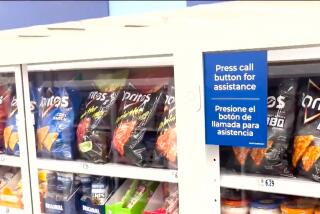Rite Aid Shareholders’ New Complaint Offers Fresh Details on Accounting Debacle
- Share via
HARRISBURG, Pa. — Former top executives at Rite Aid Corp. improperly pledged corporate assets to secure a bank loan and tried to pay a subordinate to manipulate earnings figures, shareholders are alleging as part of a class-action lawsuit.
The new charges are part of an amended complaint accusing the drugstore chain of releasing misleading information that artificially inflated share value. Rite Aid has settled claims against it, and agreed to provide plaintiffs with details to bolster their suit against the company’s former executives and auditing firm.
“The extent of defendant’s accounting manipulations was extraordinary, touching nearly every significant aspect of the company’s income statements and balance sheets for fiscal years 1997, 1998 and 1999,” stated the complaint, filed Jan. 31 in U.S. District Court in Philadelphia.
It alleges that three former Rite Aid officials, Chief Executive Martin Grass, Chief Financial Officer Frank Bergonzi and President Timothy Noonan, collaborated to manipulate earnings figures as early as 1997 and until Grass was ousted by the Rite Aid board in October 1999.
The complaint also accuses the company’s former auditing firm, KPMG LLP, of being aware that the accounting was “deficient.” But auditors continued to sign off on the statements as “clean” because Camp Hill-based Rite Aid was a big client that paid “millions of dollars in annual consulting fees.”
Rite Aid, the nation’s third-largest drugstore chain, declined to comment about the lawsuit, which was originally filed in March 1999. But the complaint is noteworthy for offering fresh details about the accounting debacle that forced it to revise earnings downward last year by more than $1 billion for fiscal years 1998 and 1999.
Bob Zeitlinger, a spokesman for KPMG, denied the allegations Thursday.
“We will vigorously defend our work,” he said, explaining that national accounting publications recognize that “even a well-planned and executed audit may not detect management fraud.”
Meanwhile, a criminal investigation into the accounting troubles is continuing, with prosecutors calling witnesses before a grand jury in recent weeks, according to The Wall Street Journal.
David Barasch, the U.S. attorney in Harrisburg, declined to comment Thursday.
According to the complaint, accounting problems at Rite Aid began to unfold in 1997, when the company sold 189 stores to a unit of J.C. Penney. Instead of logging the one-time gain of $82.6 million, the company improperly put it into an internal reserve account to “inflate” future operating income.
Later in early 1999, Bergonzi continually sought the help of then-corporate controller Steven Kindler to find ways to make the earnings figures look better on the books. The complaint states that Bergonzi offered Kindler $20,000, telling him, “We’re going to have to get dirty here.”
And the complaint reveals that Grass was ousted by the Rite Aid board in 1999 because he improperly pledged corporate assets to secure a bank loan for the company and then falsified board minutes.
An attorney for Grass called the allegations “totally false and indeed, scandalous.”
The Washington attorney, who would speak only on condition his name not be used, said telephone records would help show that the pledging of assets to J.P. Morgan was made with full knowledge of the board’s finance committee. The minutes were drafted by Rite Aid’s general counsel and never falsified by Grass, he said.
Attorneys representing Bergonzi did not return phone calls seeking comment.
In trading Thursday, Rite Aid shares were down 24 cents to $4.26.
More to Read
Inside the business of entertainment
The Wide Shot brings you news, analysis and insights on everything from streaming wars to production — and what it all means for the future.
You may occasionally receive promotional content from the Los Angeles Times.










